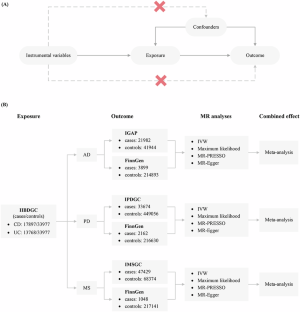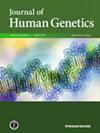克罗恩病和溃疡性结肠炎与神经系统疾病风险的关系:大规模孟德尔随机研究。
IF 2.6
3区 生物学
Q2 GENETICS & HEREDITY
引用次数: 0
摘要
观察性研究表明,克罗恩病(CD)和溃疡性结肠炎(UC)患者罹患阿尔茨海默病(AD)、帕金森病(PD)和多发性硬化症(MS)的风险增加。我们的目的是通过一项双样本孟德尔随机化(MR)研究,评估克罗恩病和溃疡性结肠炎与AD、PD和MS发病风险之间的因果关系。根据国际炎症性肠病遗传学联盟(International Inflammatory Bowel Disease Genetics Consortium)发布的欧洲裔全基因组关联研究(GWAS),确定了与 CD(17897 例病例和 33977 例对照)和 UC(13768 例病例和 33977 例对照)相关的独立单核苷酸多态性作为遗传工具。AD(合计:25881 个病例和 256837 个对照)、PD(合计:35836 个病例和 665686 个对照)和 MS(合计:48477 个病例和 285515 个对照)的汇总统计数据分别来自欧洲血统的最大 GWAS 和 FinnGen 研究。在主要分析中使用反方差加权法生成 MR 估计值,并进行了一系列敏感性分析。每个结果数据库都进行了MR分析,然后进行元分析以得出综合估计值。遗传预测的 UC 与 AD(合并:OR,1.03;95% CI,1.01-1.05;P = 1.80 × 10-3)和 MS(合并:OR,1.37;95% CI,1.23-1.53;P = 1.18 × 10-8)风险增加显著相关,而遗传预测的 UC 与 PD 风险之间没有关联。相比之下,遗传预测的 CD 与 AD、PD 和 MS 没有明显关联。MR-Egger回归显示,已确定的关联没有方向性褶积效应,采用不同MR方法进行的敏感性分析进一步证实了这些发现。这项研究表明,UC对AD和多发性硬化症有明显的不利影响,强调UC患者应尽早接受干预和最佳的辅助药物治疗,以降低AD和多发性硬化症的风险。本文章由计算机程序翻译,如有差异,请以英文原文为准。


Association of Crohn’s disease and ulcerative colitis with the risk of neurological diseases: a large-scale Mendelian randomization study
Observational studies suggested increased risks of Alzheimer’s disease (AD), Parkinson’s disease (PD), and multiple sclerosis (MS) in patients with Crohn’s disease (CD) and ulcerative colitis (UC). We aimed to assess the causality for the associations of CD and UC with the risks of AD, PD, and MS through a two-sample Mendelian randomization (MR) study. Independent single nucleotide polymorphisms associated with CD (17,897 cases and 33,977 controls) and UC (13,768 cases and 33,977 controls) were identified as genetic instruments based on a European-descent genome-wide association study (GWAS) released by the International Inflammatory Bowel Disease Genetics Consortium. Summary statistics for AD (combined: 25,881 cases and 256,837 controls), PD (combined: 35,836 cases and 665,686 controls), and MS (combined: 48,477 cases and 285,515 controls) were obtained from the largest GWASs and FinnGen study of European ancestry, respectively. MR estimates were generated using the inverse-variance weighted method in the main analysis with a series of sensitivity analyses. MR analyses were conducted per outcome database and were subsequently meta-analyzed to generate combined estimates. Genetically predicted UC was significantly associated with increased risks of AD (combined: OR, 1.03; 95% CI, 1.01–1.05; P = 1.80 × 10−3) and MS (combined: OR, 1.37; 95% CI, 1.23–1.53; P = 1.18 × 10−8), while there was no association between genetically predicted UC and the risk of PD. In contrast, no significant associations were observed for genetically predicted CD with AD, PD, and MS. MR-Egger regression showed no directional pleiotropy for the identified associations, and sensitivity analyses with different MR methods further confirmed these findings. This study suggested significant adverse effects of UC on AD and MS, highlighting that UC patients should receive early intervention with optimal adjunctive medical therapy to reduce the risks of AD and MS.
求助全文
通过发布文献求助,成功后即可免费获取论文全文。
去求助
来源期刊

Journal of Human Genetics
生物-遗传学
CiteScore
7.20
自引率
0.00%
发文量
101
审稿时长
4-8 weeks
期刊介绍:
The Journal of Human Genetics is an international journal publishing articles on human genetics, including medical genetics and human genome analysis. It covers all aspects of human genetics, including molecular genetics, clinical genetics, behavioral genetics, immunogenetics, pharmacogenomics, population genetics, functional genomics, epigenetics, genetic counseling and gene therapy.
Articles on the following areas are especially welcome: genetic factors of monogenic and complex disorders, genome-wide association studies, genetic epidemiology, cancer genetics, personal genomics, genotype-phenotype relationships and genome diversity.
 求助内容:
求助内容: 应助结果提醒方式:
应助结果提醒方式:


